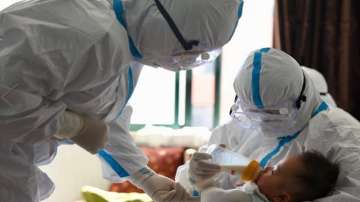Researchers have assessed 33 infants born to mothers with COVID-19, including three who were likely born with the disease, a finding that may lead to early diagnosis and better treatment for the youngest population at risk of infection. The scientists, including Wenhao Zhou from Fudan University in China, said it is crucial to screen pregnant women and closely monitor neonates at risk of COVID-19.
According to the study, published in the journal JAMA Pediatrics, the most common symptom shown by the three infants was shortness of breath.
The first patient, born at 40 weeks of gestation, experienced lethargy and fever on the second day since birth, and was moved to the neonatal intensive care unit, the study noted.
"A chest radiographic image showed pneumonia, but other laboratory tests were normal. Nasopharyngeal and anal swabs were positive for SARS-CoV-2 on days two and four of life, and negative on day six," the scientists wrote in the study.
They said the second patient was born after a gestation period of 40 weeks and four days by cesarean delivery because of confirmed maternal COVID-19 pneumonia.
This baby, the researchers said, exhibited lethargy, vomiting, and fever, with a chest scan showing pneumonia.
They said nose, throat, and anal swabs from the baby tested positive for the presence of the novel coronavirus, SARS-CoV-2, on days two and four of life, and negative on day six.
According to the research, the third patient, born after a gestation of 31 weeks and 2 days was delivered via cesarean since the mother had COVID-19 pneumonia.
The scientists said this baby required resuscitation. They confirmed neonatal respiratory distress syndrome and pneumonia with chest radiographic image.
These symptoms, the study said were resolved on day 14 of life after treatment with noninvasive ventilation, caffeine, and antibiotics.
However, of the three babies with symptomatic COVID-19, the scientists suspect that the most seriously ill neonate may have been symptomatic from prematurity, asphyxia, and sepsis, rather than SARS-CoV-2 infection.
While recent studies have said there are no clinical findings suggestive of COVID-19 in babies born to affected mothers, and all samples like amniotic fluid and breast milk, were negative for SARS-CoV-2, the researchers said, "the vertical maternal-fetal transmission cannot be ruled out in the current cohort."
"It is crucial to screen pregnant women and implement strict infection control measures, quarantine of infected mothers, and close monitoring of neonates at risk of COVID-19," the scientists wrote in the study.
ALSO READ | Coronavirus found in pangolins smuggled into China
ALSO READ | Scientists in 2007 warned China was a 'time bomb' for COVID-19
